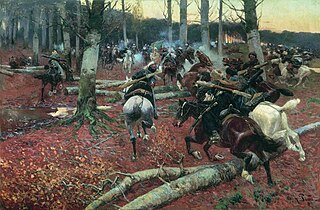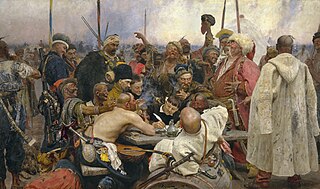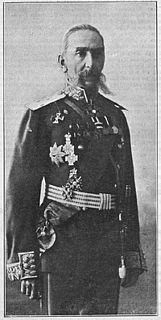 W
WThe Caucasian War of 1817–1864 was an invasion of the Caucasus by the Russian Empire which resulted in Russia's annexation of the areas of the North Caucasus, and the ethnic cleansing of Circassians. It consisted of a series of military actions waged by the Empire against the native peoples of the Caucasus including the Chechens, Adyghe, Abkhaz–Abaza, Ubykhs, Kumyks and Dagestanians as Russia sought to expand. Among the Muslims, resistance to the Russians was described as jihad.
 W
WThe Siege of Akhulgo (1839) was a siege during the Murid War in the Caucasus. General Grabbe besieged Imam Shamil in the rock-fortress of Akhulgo. After 80 days the rock was taken and most of the defenders were killed, but Shamil managed to escape.
 W
WAzov Cossack Host was a Cossack host that existed on the northern shore of the Sea of Azov, between 1832 and 1862.
 W
WThe Battle of Gordali was one of the fiercest Battles of the Caucasian Wars. The battle between the Separate Caucasian Corps of the Caucasian Army under the command of Colonel Baklanov and the Chechen troops under the leadership of Naib's Eski and Talhig took place on August 11, 1852, near the village of Gurdali, located on the Michik River. The purpose of the campaign was to destroy the village of Gordali. The Russians managed to break into the village, but due to heavy losses Baklanov was forced to retreat.
 W
WThe Battle of Qbaada was a last stand battle in 1864 fought between the last remains of the Circassians and the Russian imperial forces during the Russo-Circassian War. It is widely accepted as the last battle of the war as no other significant battle, other than minor rebellions, occurred.
 W
WThe Crimean War was a military conflict fought from October 1853 to February 1856 in which Russia lost to an alliance of France, the Ottoman Empire, the United Kingdom and Sardinia. The immediate cause of the war involved the rights of Christian minorities in the Holy Land, which was part of the Ottoman Empire. The French promoted the rights of Roman Catholics, and Russia promoted those of the Eastern Orthodox Church. Longer-term causes involved the decline of the Ottoman Empire and the unwillingness of Britain and France to allow Russia to gain territory and power at the expense of the Ottoman Empire. It has widely been noted that the causes, in one case involving an argument over a key, had never revealed a "greater confusion of purpose" but led to a war that stood out for its "notoriously incompetent international butchery".
 W
WThe Dargo Campaign of 1845 was a campaign and series of battles during the Murid War, the eastern phase of the Caucasus War of 1817–1864. During the campaign, Vorontsov penetrated too deeply into enemy country, was surrounded, fought his way part-way out with heavy losses and was rescued by General Freitag.
 W
WThe Battle of Ghunib was a siege between the Russian Empire and the Caucasian Imamate in 1859. After 25 years of resistance Imam Shamil surrendered to the Russians. See Murid War#The end (1857-1859).
 W
WThe Battle of Gimry (1832), during the Murid War, was General Velyaminov’s capture of Ghazi Muhammad’s headquarters at Gimry. Ghazi Mohammad was killed but Shamil escaped.
 W
WThe Battle of Ichkeria (1842) was the attempt by General Grabbe to take Imam Shamil's capital at Dargo during the Russian conquest of the Caucasus. It failed because of the difficulty of moving a large force through the forest.
 W
WMir-Fatah-Agha, commonly known as Mushthaid, was a high-ranking Twelver Shi'a Muslim cleric from Tabriz, whom the Russian government credited with keeping the Muslim population of the Caucasus loyal to the Russians, following their recent expansion and conquering of the Caucasus at the expense of Qajar Persia.
 W
WThe Murid War was the eastern component of the Caucasian War of 1817–1864. In the Murid War, the Russian Empire conquered the independent peoples of the eastern Ciscaucasus.
 W
WThe North Caucasus Line was a line of Russian forts and Cossack settlements along the north side of the Caucasus Mountains. Originating in the mid 16th century with a few free Cossacks near the Caspian Sea, from the mid 18th century the line was pushed west and used as a base to conquer the mountains to the south and to populate the steppes to the north.
 W
WVasily Aleksandrovich Potto was a Russian lieutenant-general (1907) and military historian, known for his landmark works on the history of the Caucasian War.
 W
WThe Russo-Circassian War was the 101 year-long military conflict between Circassia and Russia. The conflict started in 1763, when the Russian Empire attempted to establish hostile forts in Circassian territory and quickly annex Circassia, followed by the Circassian refusal of the annexation; only ending 101 years later when the last resistance army of Circassia was defeated on 21 May 1864, making it exhausting and casualty heavy for the Russian Empire as well as being the single longest war Russia ever waged in history.
 W
WThe Battle of the Valerik River on July 11, 1840 was fought as part of the Russian conquest of the Caucasus. It occurred about 30 km southwest of the fortress of Groznaya between forces of the Imperial Russian Army and North Caucasian mountaineers led by the naib (viceroy) Ahberdila Muhammad. It remains famous because of the poem "Valerik" by Mikhail Lermontov, a participant.